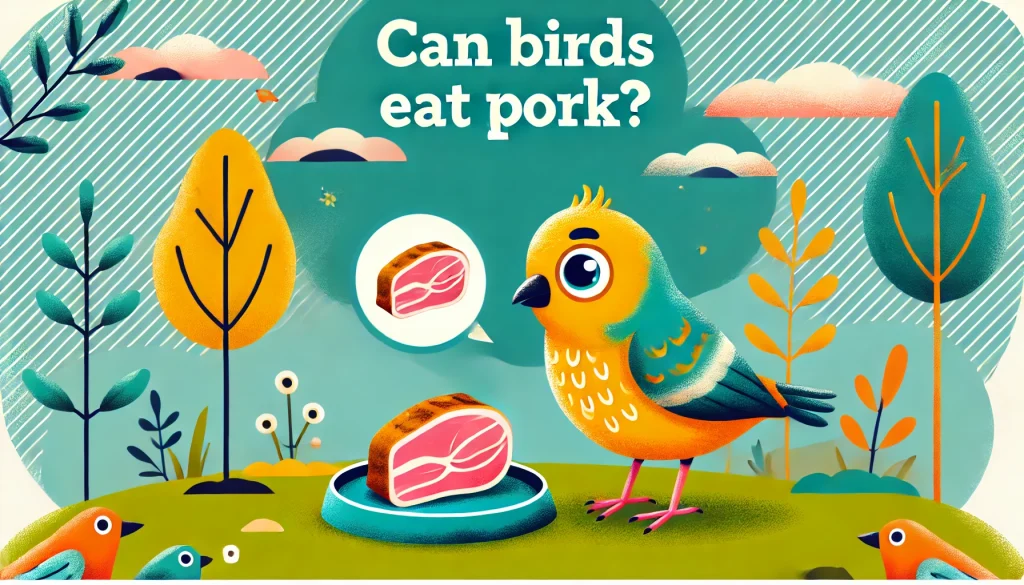
Can Birds Eat Pork?
No, it is not safe for birds to eat pork. Pork and other types of meat are generally not suitable for birds due to their high fat content and the potential for digestive issues. Birds have sensitive digestive systems, and consuming pork can lead to obesity, fatty liver disease, and other health problems. Additionally, pork can be difficult for birds to digest properly, and the seasoning or additives often used in cooking can be harmful to them.
Birds do not naturally gorge on meat, especially processed meat like pork. In fact, the consumption of pork can pose serious health risks to them.
Pork fat can clog avian arteries over time, potentially leading to cardiovascular issues. Not to mention, the high salt content could upset their water balance, turning them dehydrated.
For your birds’ safety and health, it’s best to keep them away from pork or any processed meat for that matter. Instead, focus on providing a balanced bird-friendly diet. Ready-to-use “bird food” is readily available in the market that is both nutritionally complete and safe for your pet birds.
The Potential Risks to Birds Eating Pork
Maintaining the health of your feathered friends are paramount, making understanding the potential dangers of feeding pork to birds an urgent and informative topic.
Salt Content in Pork
The sodium found in pork presents a significant threat to birds. Birds’ bodies don’t process sodium as effectively as larger creatures like humans. Consuming excessive amounts of salt adversely affects their kidney and heart functions. Examples include ham and bacon; both contain high sodium levels detrimental to birds’ health.
Fat Content in Pork
Highlighting the second risk, the fat content in pork raises concern. Birds require a diet low in fat, making pork an unsuitable option. It’s no secret that pork, particularly processed types such as bacon and sausages, contain high amounts of fat. High-fat diets often lead to obesity in birds, subsequently triggering related health problems like Fatty Liver Disease—a condition where birds’ livers enlarge due to fat accumulation—triggering serious health consequences.
Concerns with Processed Pork
Among the discussions about pork, it’s crucial to spotlight issues with processed pork products. Processed pork includes products like ham, bacon and sausages, often containing preservatives and nitrates harmful to birds. Empirical studies link these unwanted additives to digestive and kidney issues in birds. Processed pork also tends to contain more fat and salt than unprocessed varieties, further increasing the risk.
With the outlined information, you now comprehend why it’s best to keep pork off their feed dishes. Always prioritize bird-specific food options to ensure your avian companions live healthier, safer lives. This way, you provide a diet that meets their unique requirements, dodging the untoward effects that feeding them pork might cause.
Safe Alternatives to Pork for Birds
After understanding the health risks tied to offering pork to feathered friends, it’s critical to examine safer, yet nourishing alternatives.
It’s not typically advised to feed most bird breeds any sort of meat unless directed by your vet. The best meat options would be unprocessed and unseasoned leaner meats such as turkey and chicken, cooked and chopped well, so that they become easily digestible sources of protein for birds, especially for larger species.
We do not advise exploring foods like this without consulting a veterinary professional. If you are looking to venture outside of fruits, nuts, and veggies for your bird, consider insects. Bugs are high in protein and low in fat, also form a natural part of many birds’ diets, particularly insectivorous birds. Opt for sources like mealworms or crickets, either live or freeze-dried.
Caring for Your Bird’s Dietary Health
Guiding your bird towards optimal health requires a careful and well-structured diet, based on specific guidelines. Below you’ll find advice to help you feed your bird safely, complemented by the benefits of consulting a bird dietician.
Tips for Feeding Birds Safely
Feed your bird safely by taking into account the species, age, and health condition. Variety plays an essential role in the dietary plan. Be sure to prepare these foods properly – clean them thoroughly and remove any seeds from fruits that might pose a choking hazard. You’re advised to monitor their reaction to new foods. Any adverse responses, such as diarrhea or refusal to eat, deserve immediate attention.
Benefits of Consultation with a Bird Dietician
Consulting with a bird dietician can bring immense benefits. Primarily, this professional can effectively customize a diet plan that fits your bird’s specific needs. For instance, cockatoos, given their sedentary nature, require a diet low in fat. In contrast, parakeets thrive on a diet that includes a good amount of seeding grasses and grains. Experts know these differences, understand nutritional composition, and tailor meal plans that ensure optimal growth, development, and vitality. Each nutritional component – proteins, carbohydrates, vitamins, and minerals – gets the right emphasis in a bird’s diet. Diets can be further adjusted as per changing seasons and life stages. Lastly, dieticians remain updated on pet food recalls, ensuring no harmful substance reaches your bird in the guise of food.
Throughout this process, remember to maintain a keen eye for any changes in your bird’s behavior or health. It’s a continuous exercise that not only nurtures your bird but also enriches your bond with your feathered friend.
